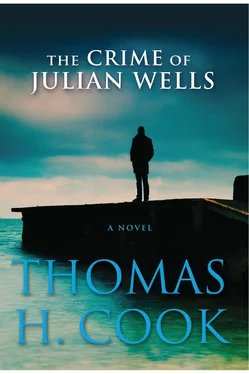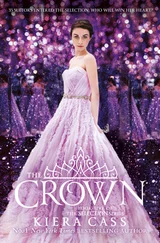Thomas Cook - The Crime of Julian Wells
Здесь есть возможность читать онлайн «Thomas Cook - The Crime of Julian Wells» весь текст электронной книги совершенно бесплатно (целиком полную версию без сокращений). В некоторых случаях можно слушать аудио, скачать через торрент в формате fb2 и присутствует краткое содержание. Год выпуска: 2012, ISBN: 2012, Издательство: Grove Press, Жанр: Криминальный детектив, на английском языке. Описание произведения, (предисловие) а так же отзывы посетителей доступны на портале библиотеки ЛибКат.
- Название:The Crime of Julian Wells
- Автор:
- Издательство:Grove Press
- Жанр:
- Год:2012
- ISBN:9780802194589
- Рейтинг книги:5 / 5. Голосов: 1
-
Избранное:Добавить в избранное
- Отзывы:
-
Ваша оценка:
- 100
- 1
- 2
- 3
- 4
- 5
The Crime of Julian Wells: краткое содержание, описание и аннотация
Предлагаем к чтению аннотацию, описание, краткое содержание или предисловие (зависит от того, что написал сам автор книги «The Crime of Julian Wells»). Если вы не нашли необходимую информацию о книге — напишите в комментариях, мы постараемся отыскать её.
The Crime of Julian Wells — читать онлайн бесплатно полную книгу (весь текст) целиком
Ниже представлен текст книги, разбитый по страницам. Система сохранения места последней прочитанной страницы, позволяет с удобством читать онлайн бесплатно книгу «The Crime of Julian Wells», без необходимости каждый раз заново искать на чём Вы остановились. Поставьте закладку, и сможете в любой момент перейти на страницу, на которой закончили чтение.
Интервал:
Закладка:
How quickly all that had changed. All of it. After Argentina.
I knew that in a novel it would be a woman who caused this change. But Julian hadn’t fallen in love with the woman we’d met there. Even so, her sudden disappearance had turned our Argentine holiday into a bitter experience, one I’d long ago managed to put behind me, but which had lingered in Julian, so that over the years he often returned to it in our conversation. I thought of the map he’d laid on the little table in the sunroom. In his last hours had he been thinking of Argentina again?
I rose from the fountain and made my way to my apartment.
It was in a prewar building with high ceilings, one of the few such buildings whose upper floors still provided a view of Central Park. Once there, I dropped into a chair and let my gaze roam among the shelves of books that stood across from me until my attention was drawn to where Julian’s books were arranged chronologically, beginning with The Tortures of Cuenca.
I drew the book from the shelf, opened it, and read the book’s dedication: For Philip, sole witness to my crime.
The “crime,” I always thought, was Julian’s decision to write about what had happened in Cuenca, an effort I disparaged at the time because I could see no need to retell a story already well known. It would be a crime to waste his time on such a book, I told him, advice he’d obviously not taken, and of which his dedication had been meant to remind me.
I’d read this dedication many times, of course, always with a knowing smile, but now it returned me to the brief few days Julian and I had spent together in Cuenca. We’d met in Madrid, where Julian had been living, doing odd jobs, picking up the first of his many languages. We’d then driven around Spain for several days before reaching the town. Our month in Argentina was more than a year behind us by then, but Julian was still laboring under the effects of what he’d experienced there, all of which I’d expected to dissipate in time.
We’d arrived at Cuenca about midday, strolled the town’s streets, then taken a table at a small cafe on the village square. Though a matter of dark renown in Spain, neither of us had ever heard of the crime that had occurred there some seventy years before. As I later discovered, it was briefly mentioned in the guidebook I’d bought in the airport before leaving New York, a book I’d intended to read on the flight but hadn’t. In any event, an English-speaking former magistrate had given us the details, an old man who’d claimed to have seen the actual figures in the story-the guards, the prisoners, even the prosecutor.
“No one thought anything about the crime of Cuenca,” he said. “I mean, that it would take so strange a turn.”
The old man had then gone through the details of what had happened there, a story he told quite well but from which he drew a somewhat banal conclusion.
“So you see, it’s quite possible for a person to disappear,” he said.
I glanced at Julian and saw that he was deep in thought. “Yes,” he said quietly, “It’s quite possible.”
The old man glanced about the village square, his gaze captured by a group of unruly teenagers, all of them speaking in loud voices, heedless of the disturbance they caused.
“ Viviamos mejor cuando vivia Franco ,” he said, almost to himself, reverting to Spanish. “We lived better when Franco lived.” With that he rose, bid us a polite good-bye, and left.
Seconds later, I noticed that Julian’s attention was focused on two Guardia Civil lounging at the entrance to one of the town’s official buildings, tall and dark, wearing their curiously winged black caps. It was such men as these who’d carried out the tortures of Cuenca, and for a moment Julian simply stared at them quietly.
Then, quite suddenly, a thought appeared to seize him.
“Let’s go,” he said.
We paid the bill, then rose, and moved along the town’s dusty streets. The evening shade was descending, the first lights coming on.
“Someone once said to me that it’s not what a man feels before he first wields the whip,” Julian said as we closed in on the road that let out of the town, “it’s what he feels after it.” He stopped and looked at me. “But it’s really what the person being whipped feels that matters. Guilt is a luxury, Philip.”
I thought of a French painter, James Tissot, the way he’d portrayed the scourging of Christ from different angles, the faces of the men who’d beaten him, obscured in one, revealed in the other.
I described these paintings to Julian, then said, “The guilt of whipping a great man would be terrible.”
“Or an innocent one,” Julian said.
We continued on, now down the hill and toward the bridge below the town. I kept quiet for a time, but finally made an attempt to lighten the mood that had descended upon us.
“So, when are you coming back to the States?” I asked.
“Never,” Julian answered so abruptly that I wondered if he had only just made that stark decision. “At least not to live.”
And so there would be no brilliant career? No rising through the ranks of government? He would never be secretary of state? Wild and unreal as those dreams had been, were they truly to be abandoned now?
All of this I voiced in a simple question.
“Are you sure, Julian?”
He stopped and looked at me. “Yes.”
His gaze had something in it that chilled me, something I expected him to voice, so that it surprised me when he said nothing more as we descended the slope that led to the river and the bridge.
I was still reliving that long-ago moment when the phone rang.
It was Loretta.
“Harry called,” she said.
She meant Harry Gibbons, Julian’s editor.
“We’ve agreed that you should deliver the eulogy at Julian’s memorial service,” Loretta said.
She repeated what she’d told me earlier: that it was to be a quiet affair, just a few friends and associates.
“Anyway, Harry has a few things you might want to include,” she added. “He thought the two of you should discuss it at his office tomorrow afternoon.”
“Okay,” I said.
A pause, then, “Are you all right, Philip?”
It was the same question my father had asked only an hour or so before, and I gave the same answer. “I’m fine.”
“You seem so. . quiet.”
“It’s how I grieve, I suppose.”
“Yes, I can see that in you,” Loretta told me. A brief silence, then, “Well, good night, Philip.”
“Good night.”
I hung up the phone, glanced down at the book in my lap. The Tortures of Cuenca with its stark cover, a drawing of the two hapless victims of that crime huddled in the dusty corner of a Spanish prison, shackled hand and foot, waiting, as they eternally would be in this rendering, for the torturer’s approach. I’d found the cover quite disturbing and said so to Julian. He’d replied with the tale of Ned Kelly’s execution, how the murderous rogue had stood on his Australian gallows, peered down at the reveling crowd, then turned to the hangman and, with a shrug, uttered his last words. “Such is life.”
I peered into the frightened eyes of these baffled and despairing men a moment longer. Had this, in the end, been Julian’s only view of life?
I drew my gaze back to the window. The park beyond it was well lighted, as it had always been, a fact that made me wonder why its reaches seemed so much darker to me now.
Darker to me now?
Heavy-handed, I decided, now in critical judgment of my own last thought. Too much foreshadowing. In a novel, as the last line of a chapter, it would make a wary reader groan.
4
“When Bernal Diaz first came with Cortes to the central market in Mexico City, he found little bowls of human feces for sale,” Harry said. “They were used in tanning leather, and Diaz said that the tanners were going around sniffing at these bowls to find the very best of the lot.”
Читать дальшеИнтервал:
Закладка:
Похожие книги на «The Crime of Julian Wells»
Представляем Вашему вниманию похожие книги на «The Crime of Julian Wells» списком для выбора. Мы отобрали схожую по названию и смыслу литературу в надежде предоставить читателям больше вариантов отыскать новые, интересные, ещё непрочитанные произведения.
Обсуждение, отзывы о книге «The Crime of Julian Wells» и просто собственные мнения читателей. Оставьте ваши комментарии, напишите, что Вы думаете о произведении, его смысле или главных героях. Укажите что конкретно понравилось, а что нет, и почему Вы так считаете.












